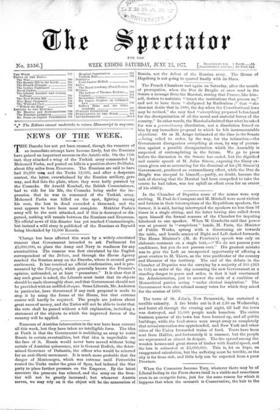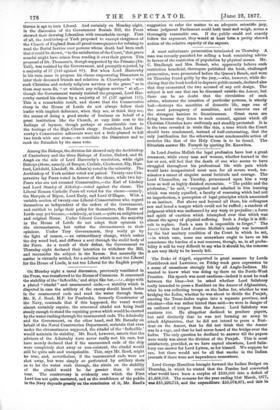When the Commons become Tory, whatever there may be of
Liberal feeling in the Peers shows itself in a visible and sometimes even in an energetic form, just for the same reason for which it happens that when the monarch is Conservative, the heir to the
throne is apt to turn Liberal. And certainly on Monday night, in the discussion of the Government Burials Bill, the Peers showed their dawning Liberalism with remarkable energy. First of all, the Archbishop of York proposed to exempt clergymen of the Church of England from all penal consequences for refusing to read the Burial Service over persons whose death had been such that it could be shown, "to the satisfaction of the Court," that grave scandal might have arisen from reading it over their graves. This proposal of Dr. Thomson's, though supported by the Primate (Dr. Tait), was resisted by the Government, and promptly rejected, by a majority of 57 (146 against 89). But when Lord Harrowby in his turn came to propose his clause empowering Dissenters to inter their deceased friends and relatives in Churchyards "with such Christian and orderly religious services at the grave" as to them may seem fit, " or without any religious service " at all,— though the Government warmly resisted the proposal, Lord Har- rowby carried his clause by a majority of 16 (127 against 111). This is a remarkable result, and shows that the Conservative sheep in the House of Lords do not always follow their leader with implicit deference, when they see, or think they see, the means of doing a good stroke of business on behalf of a great institution like the Church, at very little cost to the feelings of laymen, though perhaps at considerable cost to the feelings of the High-Church clergy. Doubtless, Lord Har- rowby's Conservative adherents were not a little pleased to kill two birds with one stone,—to conciliate the Dissenters and to snub the Ritualists by the same vote.



































